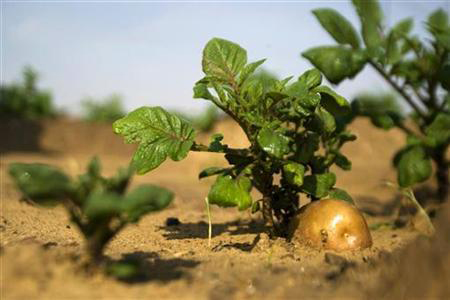Navigation
Eco-Farming Can Double Food Production in 10 Years, says New UN Report
Small-scale farmers can double food production in a decade by using simple ecological methods, according to the findings of a new United Nations study released on March 8, 2011, which calls for a fundamental shift towards agroecology as a poverty alleviation measure.
 |
| "If food prices are not kept under control and populations are unable to feed themselves...we will have increasingly states being disrupted and failed states developing," De Schutter said. Among examples, thousands of Kenyan farmers were planting insect-repelling Desmodium or tick clover, used as animal fodder, within corn fields to keep damaging insects away and sowed small plots of napier grass nearby that excretes a sticky gum to trap pests. Text from Reuters news report, “Eco-Farming Can Double Food Output By Poor: U.N.” 9 March 2011. Photograph of Desmodium discolor - Fabaceae Parque Olhos D'Água, Brasília by João Medeiros, Wikipedia. |
Today’s scientific evidence demonstrates that agroecological methods outperform the use of chemical fertilizers in boosting food production where the hungry live – especially in unfavourable environments,” according to Olivier De Schutter, the UN Special Rapporteur on the right to food and author of the report, entitled “Agro-ecology and the right to food.”
Small-scale farmers can double food production in a decade by using simple ecological methods, according to the findings of a new United Nations study released on March 8, 2011, which calls for a fundamental shift towards agroecology as a poverty alleviation measure.
 |
| Potato grows in a field irrigated by recycled waste water in Kibbutz Magen in southern Israel. Photograph courtesy of Reuters/Amir Cohen, November 15, 2010. |
“To feed 9 billion people in 2050, we urgently need to adopt the most efficient farming techniques available,” says Olivier De Schutter, the UN Special Rapporteur on the right to food and author of the report, entitled “Agro-ecology and the right to food.”
“Today’s scientific evidence demonstrates that agroecological methods outperform the use of chemical fertilizers in boosting food production where the hungry live – especially in unfavourable environments,” he added.
Agroecology applies ecological science to the design of agricultural systems that can help put an end to food crises and address climate-change and poverty. It enhances soils productivity and protects the crops against pests by relying on the natural environment such as beneficial trees, plants, animals and insects, according to the study.
“To date, agroecological projects have shown an average crop yield increase of 80 per cent in 57 developing countries, with an average increase of 116 per cent for all African projects,” Mr. De Schutter says. “Recent projects conducted in 20 African countries demonstrated a doubling of crop yields over a period of 3 to 10 years.”
Conventional farming relies on expensive inputs, fuels climate change and is not resilient to climatic shocks, notes the study, which is based on extensive review of existing scientific data.
“It simply is not the best choice anymore today,” Mr. De Schutter stresses. “A large segment of the scientific community now acknowledges the positive impacts of agroecology on food production, poverty alleviation and climate change mitigation – and this is what is needed in a world of limited resources.
“Malawi, a country that launched a massive chemical fertilizer subsidy programme a few years ago, is now implementing agroecology, benefiting more than 1.3 million of the poorest people, with maize yields increasing from 1 ton per hectare to 2-3 tons/ha,” Mr. De Schutter writes.
The report also points out that projects in Indonesia, Viet Nam and Bangladesh recorded up to 92 per cent reduction in insecticide use for rice, leading to important savings for poor farmers.
“Knowledge came to replace pesticides and fertilizers. This was a winning bet, and comparable results abound in other African, Asian and Latin American countries,” the independent expert notes in the report presented to the UN Human Rights Council in Geneva.
He adds that the approach is also gaining ground in developed countries such as the United States, Germany and France. “However, despite its impressive potential in realizing the right to food for all, agroecology is still insufficiently backed by ambitious public policies and consequently hardly goes beyond the experimental stage,” he points out.
The report also identifies measures that States should implement to scale up agroecological practices.
“Agroecology is a knowledge-intensive approach. It requires public policies supporting agricultural research and participative extension services,” Mr. De Schutter says. “States and donors have a key role to play here. Private companies will not invest time and money in practices that cannot be rewarded by patents and which don’t open markets for chemical products or improved seeds,” he adds.
This news is from the UN News Centre, March 8, 2011.
*The report “Agro-ecology and the right to food” was presented today before the UN Human Rights Council in Geneva. This document is available in Arabic, Chinese, English, French, Russian and Spanish at: http://www2.ohchr.org/english/issues/food/annual.htm
For more information on the mandate and work of the Special Rapporteur, visit: http://www2.ohchr.org/english/issues/food/index.htm or www.srfood.org
Search
Latest articles
Agriculture
- World Water Week: Healthy ecosystems essential to human health: from coronavirus to malnutrition Online session Wednesday 24 August 17:00-18:20
- World Water Week: Healthy ecosystems essential to human health: from coronavirus to malnutrition Online session Wednesday 24 August 17:00-18:20
Air Pollution
- "Water and Sanitation-Related Diseases and the Changing Environment: Challenges, Interventions, and Preventive Measures" Volume 2 Is Now Available
- Global Innovation Exchange Co-Created by Horizon International, USAID, Bill and Melinda Gates Foundation and Others
Biodiversity
- It is time for international mobilization against climate change
- World Water Week: Healthy ecosystems essential to human health: from coronavirus to malnutrition Online session Wednesday 24 August 17:00-18:20
Desertification
- World Water Week: Healthy ecosystems essential to human health: from coronavirus to malnutrition Online session Wednesday 24 August 17:00-18:20
- UN Food Systems Summit Receives Over 1,200 Ideas to Help Meet Sustainable Development Goals
Endangered Species
- Mangrove Action Project Collaborates to Restore and Preserve Mangrove Ecosystems
- Coral Research in Palau offers a “Glimmer of Hope”
Energy
- Global Innovation Exchange Co-Created by Horizon International, USAID, Bill and Melinda Gates Foundation and Others
- Wildlife Preservation in Southeast Nova Scotia
Exhibits
- Global Innovation Exchange Co-Created by Horizon International, USAID, Bill and Melinda Gates Foundation and Others
- Coral Reefs
Forests
- NASA Satellites Reveal Major Shifts in Global Freshwater Updated June 2020
- Global Innovation Exchange Co-Created by Horizon International, USAID, Bill and Melinda Gates Foundation and Others
Global Climate Change
- It is time for international mobilization against climate change
- It is time for international mobilization against climate change
Global Health
- World Water Week: Healthy ecosystems essential to human health: from coronavirus to malnutrition Online session Wednesday 24 August 17:00-18:20
- More than 400 schoolgirls, family and teachers rescued from Afghanistan by small coalition
Industry
- "Water and Sanitation-Related Diseases and the Changing Environment: Challenges, Interventions, and Preventive Measures" Volume 2 Is Now Available
- Global Innovation Exchange Co-Created by Horizon International, USAID, Bill and Melinda Gates Foundation and Others
Natural Disaster Relief
- STOP ATTACKS ON HEALTH CARE IN UKRAINE
- Global Innovation Exchange Co-Created by Horizon International, USAID, Bill and Melinda Gates Foundation and Others
News and Special Reports
- World Water Week: Healthy ecosystems essential to human health: from coronavirus to malnutrition Online session Wednesday 24 August 17:00-18:20
- STOP ATTACKS ON HEALTH CARE IN UKRAINE
Oceans, Coral Reefs
- World Water Week: Healthy ecosystems essential to human health: from coronavirus to malnutrition Online session Wednesday 24 August 17:00-18:20
- Mangrove Action Project Collaborates to Restore and Preserve Mangrove Ecosystems
Pollution
- Zakaria Ouedraogo of Burkina Faso Produces Film “Nzoue Fiyen: Water Not Drinkable”
- "Water and Sanitation-Related Diseases and the Changing Environment: Challenges, Interventions, and Preventive Measures" Volume 2 Is Now Available
Population
- "Water and Sanitation-Related Diseases and the Changing Environment: Challenges, Interventions, and Preventive Measures" Volume 2 Is Now Available
- "Water and Sanitation-Related Diseases and the Changing Environment: Challenges, Interventions, and Preventive Measures" Volume 2 Is Now Available
Public Health
- Honouring the visionary behind India’s sanitation revolution
- Honouring the visionary behind India’s sanitation revolution
Rivers
- World Water Week: Healthy ecosystems essential to human health: from coronavirus to malnutrition Online session Wednesday 24 August 17:00-18:20
- Mangrove Action Project Collaborates to Restore and Preserve Mangrove Ecosystems
Sanitation
- Honouring the visionary behind India’s sanitation revolution
- Honouring the visionary behind India’s sanitation revolution
Toxic Chemicals
- "Water and Sanitation-Related Diseases and the Changing Environment: Challenges, Interventions, and Preventive Measures" Volume 2 Is Now Available
- Actions to Prevent Polluted Drinking Water in the United States
Transportation
- "Water and Sanitation-Related Diseases and the Changing Environment: Challenges, Interventions, and Preventive Measures" Volume 2 Is Now Available
- Urbanization Provides Opportunities for Transition to a Green Economy, Says New Report
Waste Management
- Honouring the visionary behind India’s sanitation revolution
- Honouring the visionary behind India’s sanitation revolution
Water
- Honouring the visionary behind India’s sanitation revolution
- Honouring the visionary behind India’s sanitation revolution
Water and Sanitation
- Honouring the visionary behind India’s sanitation revolution
- Honouring the visionary behind India’s sanitation revolution

